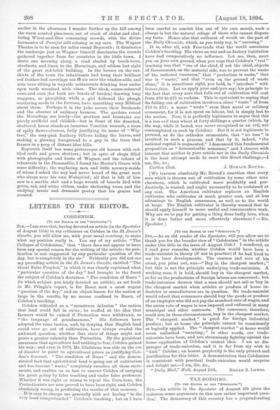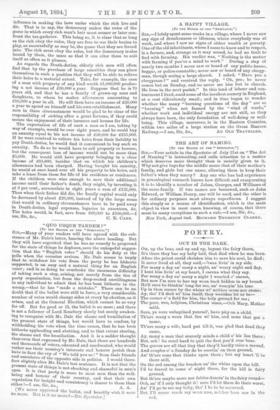TAX-DODGING.
[TO THE EDITOR Or THE "SPECTATOR."] It,—An article in the Spectator of August 4th gives the 00 mon-sense arguments on this now rather important clues.. tion. The democracy of this country has a preponderating
influence in making the laws under which the rich live and die. That is to say, the democracy makes the rules of the game in which every rich man's heir must sooner or later con- front the tax-gatherer. This being so, it is clear that so long as the rich obey the rules, they are free to use their brains to play, as successfully as may be, the game that they are forced into. The rich must obey the rules, but the democracy is also bound by them, the more so that it can alter them to suit itself as often as it pleases. As regards the Death-duties, elderly rich men will often find that by the purchase of large annuities they can place themselves in such a position that they will be able to relieve their heirs to a material extent, Take, for example, the case of a man with property of any kind worth £1,000,000 produc- ing a net income of £30,000 a year. Suppose that he is 70 years old, and that he has a family of grown-up sons and daughters, to whom he makes allowances amounting to £10,000 a year in all. He will then have an income of £20,000 a year to spend on himself and his own establishment. Many men in these circumstances would be glad to be clear of the responsibility of looking after a great fortune, if they could secure the enjoyment of their incomes and houses for life.
The expectation of life of such a man as I am, taking by way of example, would be over eight years, and he could buy an annuity equal to his net income of £20,000 for £155,000. If he were resolved to relieve his heirs from their liability to pay Death-duties, he would find it convenient to buy such an annuity. To do so he would have to sell property or borrow, but the consequent lose of income would not be more than £5,000. He would still have property bringing in a clear income of £15,000, besides that on which his children's allowances had been charged. Having bought his annuity, he would at once hand over all his property to his heirs, and take a lease from them for life of his residence or residences. If the children were wise enough to save their additional income until their father's death, they might, by investing it at 3 per cent., accumulate in eight years a sum of £135,000. Thus when their father did die, the family capital would only be decreased by about £20,000, instead of by the large sums that would in ordinary circumstances have to be paid away in Death-duties, legal expenses, legacies to executors, &c. The heirs would, in fact, save from £60,000 to £100,000.—I



































 Previous page
Previous page